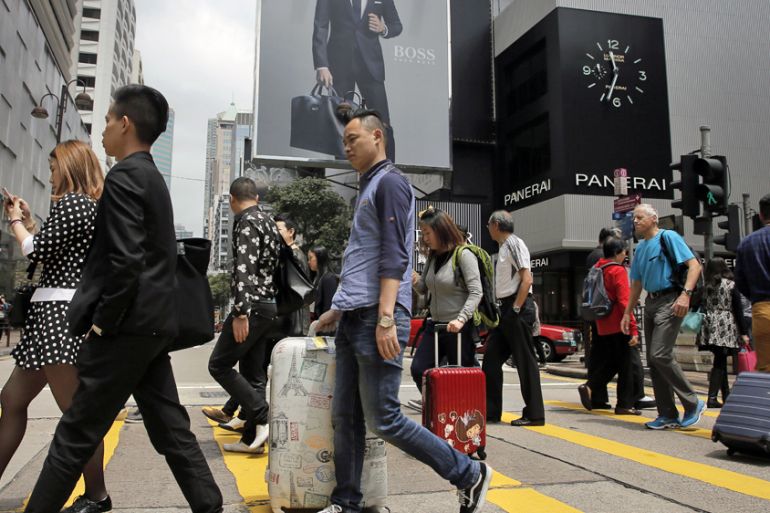China cancels multiple visit passes to Hong Kong
Move is aimed to cool tensions over growing influx of mainland shoppers, which has angered Hong Kong residents.

China has made curbs on travel to Hong Kong to cool tensions over the growing influx of mainland shoppers, which has angered residents of the Asian financial hub.
The public security bureau in neighbouring Shenzhen will stop issuing multiple visit passes to people who live in the border city and instead issue only once-a-week travel passes, the state-run Xinhua news agency reported.
Keep reading
list of 4 itemsRussia’s Putin eyes greater support from China for Ukraine war effort
India-Iran port deal: A gateway to Central Asia or a geostrategic headache?
India’s income inequality widens, should wealth be redistributed?
Leung Chun-yin, the chief executive of the semi-autonomous territory confirmed those reports in saying on Monday that the visa arrangements is “a policy suggested by the Hong Kong government and adopted by the Central authorities”.
| Notes from the field |
Al Jazeera’s Divya Gopalan, reporting from Hong Kong
 Shenzen is considered a special economic zone and its residents were the only people on the mainland to be given multiple entry permit into Hong Kong. It was put in place at a time when Hong Kong’s economy was in the doldrums and needed a boost. China was hoping the increased number of tourists would help Hong Kong businesses, parallel trading was an unexpected side effect. Just a 10-minute train ride away border towns in Hong Kong proved to be a popular shopping destinations for daily goods like baby formula, diapers and hygiene products. Locals in Sheung Shui told us that their neighbourhoods have changed to cater to these bulk buyers. Pharmacies have replaced mom and pop stores, and high rents have squeezed out shops catering to the locals.
|
Al Jazeera’s Divya Gopalan, reporting from Hong Kong, said the Chinese authorities introduced the multiple entry system six years ago to encourage a free flow of business, people and possibly more integration between the two sides.
“The government did not anticipate the impact the visitors from mainland China would have on Hong Kong,” Gopalan said.
Simon Shen, an analyst at Chinese University of Hong Kong, told Al Jazeera that “the original context was very different”.
“At that time Hong Kong was facing economic crisis and all kinds of setbacks. So at that time they did not calculate so much about to what extent Hong Kong could support these external tourists,” Shen said.
An influx of millions of Chinese visitors to Hong Kong has prompted rallies by frustrated residents recently tired of seeing public transport clogged and shelves periodically wiped clean of daily necessities purchased for resale over the border.
The central government in Beijing has adjusted the travel policy because, “alongside the unceasing growth of mainland residents travelling to Hong Kong and growing pressure on mainland and Hong Kong immigration ports, there’s growing contradiction between visitor numbers to Hong Kong and Hong Kong tourism’s capability,” the Xinhua report said.
Leung said: “anything that increases tensions between Hong Kong and mainland society is not tolerated”.
The decision was aimed at curbing the practice of parallel trading, Leung said, in which mainlanders buy up daily necessities in Hong Kong then resell them in China’s border towns to avoid tariffs.
Admitting that the move will not put an end completely to parallel trading, he added the government will continue to crack down on any illegal activities. He also said: “Anything that increases tensions between Hong Kong and the mainland society is not tolerated.”
Hong Kong opened up to Chinese tourists in 2003 as part of a bid to revive its economy following an outbreak of the respiratory disease SARS, allowing mainland Chinese to visit as individual travellers rather than being part of an organised tour.
Last year alone an estimated 47 million tourists from China streamed to Hong Kong, dwarfing the city’s population of seven million.
Leung said that about 4.6 million of the visitors made trips to Hong Kong more than once a week.